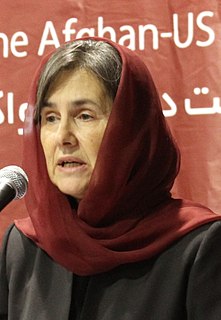A Quote by Khaled Hosseini
I wanted to write about Afghanistan before the Soviet war because that is largely a forgotten period in modern Afghan history.
Related Quotes
In 2001, we were told that the war in Afghanistan was a feminist mission. The marines were liberating Afghan women from the Taliban. Can you really bomb feminism into a country? And now, after 25 years of brutal war - 10 years against the Soviet occupation, 15 years of US occupation - the Taliban is riding back to Kabul and will soon be back to doing business with the United States.
My family left Afghanistan in 1976, well before the Communist coup and the Soviet invasion. We certainly thought we would be going back. But when we saw those Soviet tanks rolling into Afghanistan, the prospect for return looked very dim. Few of us, I have to say, envisioned that nearly a quarter century of bloodletting would follow.
In Iraq, until before the war, the women were scientists, museum directors, doctors. I'm not valourising Saddam Hussein or the Soviet occupation of Afghanistan, which was brutal and killed hundreds of thousands of people - it was the Soviet Union's Vietnam. I'm just saying that now, in these new wars, whole countries have slipped into mayhem - the women have just been pushed back into their burqas - and not by choice.


































